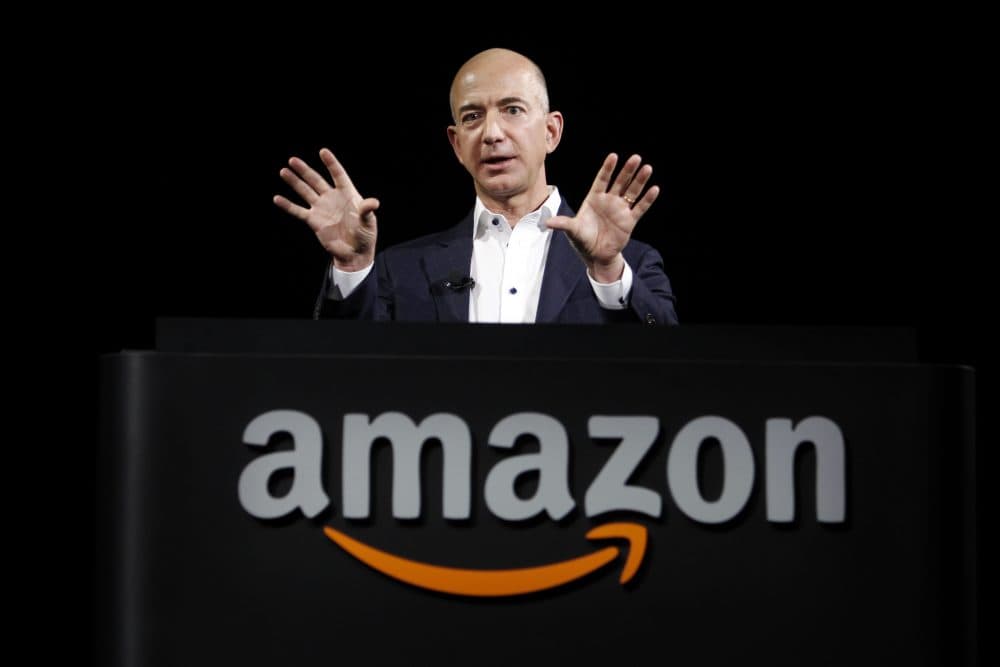Advertisement
Amazon Announces Location Of HQ2 — And It's Not Boston

Amazon's 14-month search for a second headquarters ended Tuesday with a split decision.
In a late change that had been anticipated since last week, the Seattle-based technology company scrapped a plan to put 50,000 workers in a single location and said it will divide that number between Crystal City, Virginia, and Long Island City, New York.
“These two locations will allow us to attract world-class talent that will help us to continue inventing for customers for years to come,” Amazon founder Jeff Bezos said in a statement. “The team did a great job selecting these sites, and we look forward to becoming an even bigger part of these communities.”
Boston was among 20 finalists named in January but appeared to fade from contention in recent weeks, amid reports that Amazon was in serious talks with New York, Dallas and Crystal City.
“I am proud that throughout this process we were able to showcase the best of all we have to offer here in the city of Boston, in a way that was transparent and led with our strengths: a talented and diverse workforce, culture of innovation and opportunity for all,” Boston Mayor Marty Walsh said in a statement. “While I am proud Boston was named to Amazon’s shortlist for its second North American headquarters, our future will not be defined by a single company, as we continue to plan for equitable, sustainable growth.”
Jesse Mermell, president of the Alliance for Business Leadership in Boston, said that “in some ways, we absolutely dodged a bullet. This would have been a huge influx into our infrastructure that, I think everyone agrees, isn’t quite ready to handle it at the state it’s currently in. At the same time, were there opportunities for growth? Were there opportunities for new investments in infrastructure? Were there opportunities for new hires? Absolutely.”
A behemoth such as Amazon could spur economic growth in a region or wreak havoc — or both. Jeff Bussgang, a general partner at Flybridge Capital Partners in Boston, said during the HQ2 search that Amazon’s arrival would be, at once, “awful” and “fabulous.”
One potential benefit would have been jolting the Legislature to improve transit systems. At a business conference in October, Boston’s economic development chief, John Barros, said the city has lacked “a package that we can take to the Legislature and say, ‘We need you to invest in infrastructure.’ With Amazon, we do” have that package.
Citizens Bank Chief Executive Bruce Van Saun told WBUR in an interview before the decision was formalized that the selection of Boston would “further boost the reputation of Massachusetts as the East Coast intellectual capital, where there’s great depth in the knowledge economy.”
Yet Amazon’s horde of six-figure earners could have accelerated gentrification in neighborhoods that already are becoming unaffordable for longtime residents. Boston pitched the 161-acre Suffolk Downs parcel that straddles East Boston and Revere as a possible HQ2 location. Parts of Somerville also were on the table.
The Suffolk Downs property is owned by the HYM Investment Group. Founder Tom O’Brien has said his firm had a “great vision” before Amazon considered moving there, “and we’ll have the same vision afterwards.”
Jay Ash, the state's secretary of housing and economic development, said Tuesday that his office continues to hold “discussions with Amazon and other companies about opportunities to grow in Massachusetts and participate in our dynamic innovation economy, engaging our world-class talent and educational institutions.”
Suffolk Downs’ proximity to Logan Airport and Blue Line access to downtown Boston were among its top selling points.
But Thomas Glynn, outgoing chief executive of the Massachusetts Port Authority and a former head of the MBTA, acknowledged in a recent Radio Boston interview that population growth tied to Amazon was a real concern.
“We’ve had a lot of population growth over the last 10 years” he said. “So, we’re getting to a point where we really have to be very strategic and savvy about how to accommodate new growth.”
As Amazon mulled its options, Boston's Walsh touted Massachusetts’s colleges as workforce pipelines for the company. But he also projected the self-assurance of a city that does not need Amazon to cement its status as a tech hub.
“This isn’t going to make or break Boston,” Walsh said at the time Boston was named a finalist. “This is in addition to what we’re already seeing in our city.”
HQ2 aside, the company has expanded its presence in the Boston area by recently opening a 900-person office in Boston's Fort Point neighborhood. In May Amazon said it will bring 2,000 additional jobs to the Seaport District in 2021.
Amazon already has outposts in Back Bay and Kendall Square, and employs about 3,500 people in Massachusetts.
“To me, and I think to many people, it’s not a big deal” to not land HQ2, said Chris Anderson, president of the Massachusetts High Technology Council. “Amazon will continue to be a significant employer. I think that’s going to be good for the local economy. But we’ve got tons of other innovative companies in a lot of different sectors that are really driving the Massachusetts economy.”
WBUR’s Zeninjor Enwemeka and Bruce Gellerman contributed reporting.
This article was originally published on November 13, 2018.
